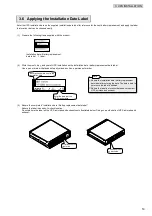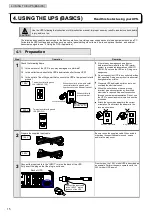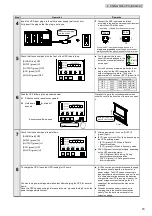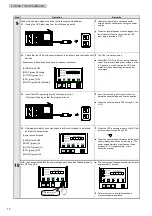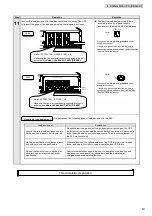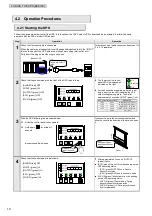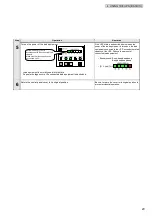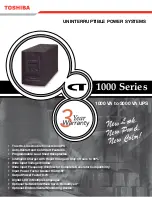
_
1.
INTRODUCTION
_
5
7. Radio Frequency Interference
CAUTION
This equipment has been tested and found to comply with the limits for a Class A digital device, pursuant to part 15 of the FCC
Rules. These limits are designed to provide reasonable protection against harmful interference when the equipment is operated in a
commercial environment. This equipment generates, uses, and can radiate radio frequency energy and if not installed and used in
accordance with the instruction manual, may cause harmful interference to radio communications. Operation of this equipment in
the residential area is likely to cause harmful interference in which case the user will be required to correct the interference at his
own expense.
8. Battery Handling Precautions
CAUTION
Do not use batteries after their service life has expired. Doing so may result in fuming or fire. Also, the battery may fail to
supply the power to load equipment in the event of a power failure.
!
Servicing of batteries should be performed or supervised by personnel knowledgeable about batteries and the required
precautions.
When replacing batteries, replace with the same type and number of batteries or battery packs. There is a risk of
explosion if a battery is replaced by an incorrect type. Battery pack model is shown in the table below.
Do not dispose of the used batteries yourself but rather contact your sales representative. The batteries in the UPS are
lead type batteries. Lead type batteries are recyclable resources. Please recycle when replacing or disposing of used
batteries.
A battery can present a risk of electrical shock and high short-circuit current. The following precautions should be
observed when working on batteries:
Remove watches, rings, or other metal objects.
Use tools with insulated handles.
Wear rubber gloves and boots.
Do not lay tools or metal parts on top of batteries.
Disconnect charging source prior to connecting or disconnecting battery terminals.
Remove battery grounds during installation and maintenance to reduce likelihood of shock.
Remove the connection from ground if any part of the battery is determined to be grounded.
Do not open or mutilate batteries. The battery contains diluted sulfuric acid. Released material is harmful to the skin and
eyes. It may be toxic.
If a battery leaks, take appropriate measures to prevent any battery fluid from contacting your skin or clothing. Diluted
sulfuric acid may cause blindness if it gets into the eye, and may burn skin upon contact. Additionally, it is electrically
conductive and corrosive. Observe the following precautions:
Wear full eye protection and protective clothing.
If sulfuric acid contacts the skin, wash it off immediately with water.
If sulfuric acid contacts the eyes, flush thoroughly and immediately with water, and seek medical attention.
Spilled sulfuric acid should be washed down with a suitable acid-neutralizing agent, such as a solution of
approximately 500 grams of bicarbonate of soda in 4 liters of water. The resulting liquid should be flushed with water
and the area dried.
Lead-acid batteries can present a risk of fire due to the generation of hydrogen gas. Observe the following precautions:
DO NOT SMOKE near batteries.
Do not allow flames or sparks near batteries.
Before working with batteries, discharge static electricity.
Do not dispose of batteries in a fire. The batteries may explode.
!
If a fire occurs near a battery, do not use water to extinguish it. Use only a powder-extinguishing agent (ABC). Using
water may cause the fire to spread. When extinguishing fires, always wear respiratory protective equipment to avoid
inhaling toxic gases and extinguish the fire from upwind.
It may cause battery leakage, overheating, or explosion. Observe the following precautions:
Do not solder to any part of a battery directly.
Do not charge the batteries with reversed positive (+) and negative (-) terminal polarity.
Do not mix different battery types, brands, or versions.
Do not attempt to peel off or break the outer covering of a battery.
Do not subject batteries to strong physical shock, or throw them away.
Do not use organic solvents such as gasoline, thinner, or benzene, or detergents such as mild detergents to clean the
batteries.
Electrical energy may remain in a battery even after its service life has expired. Do not allow sparks near or
short-circuit used batteries.
!
!
Battery Pack Model No.
Quantity
Manufacture
Remarks
BPE11B102A00
1
SANYO DENKI
HRL1234WF2FR (Hitachi Chemical Energy Technology),
2 pcs

















